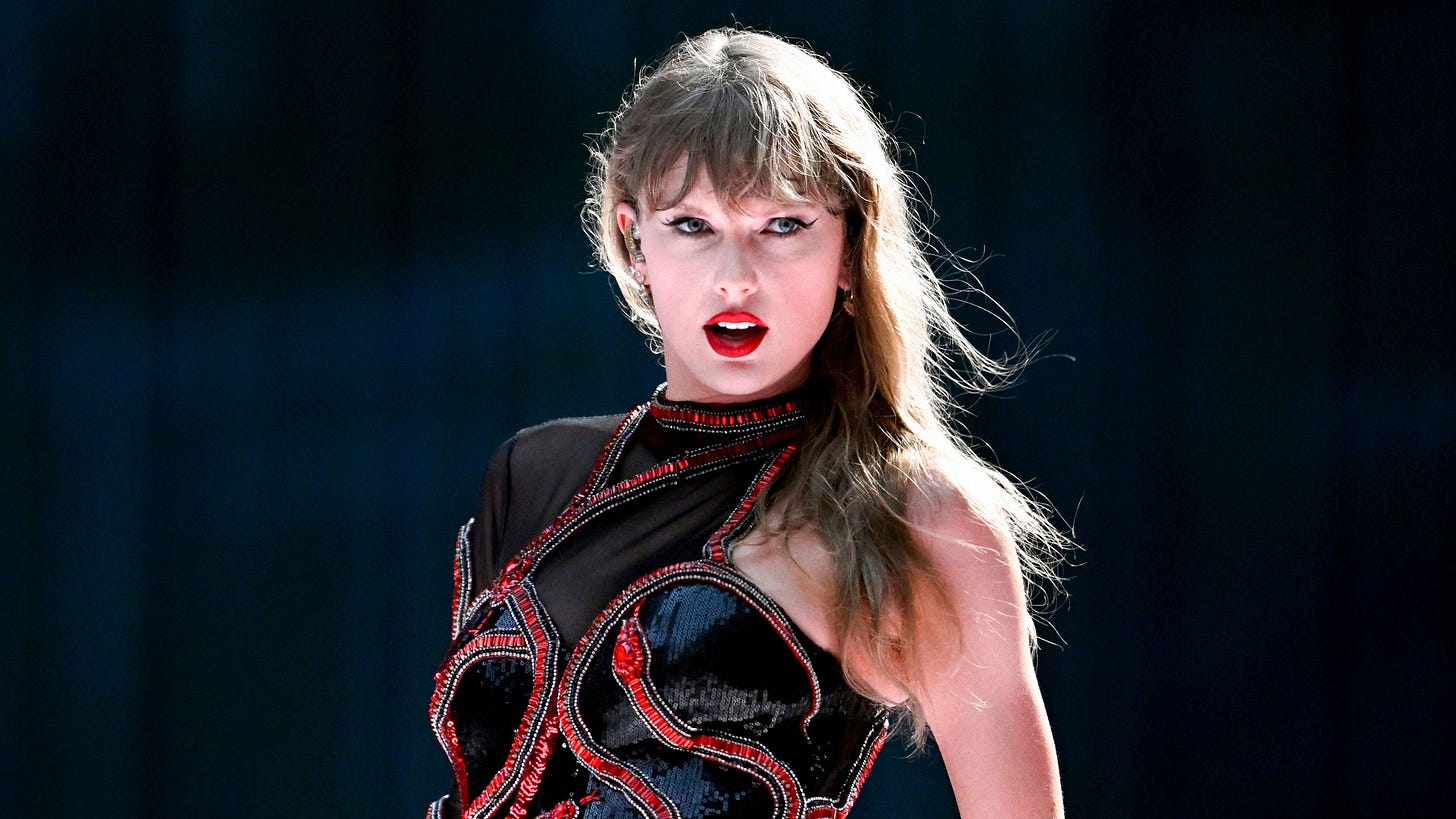First of all, no — Taylor Swift did not debut Rep (TV) on The Handmaid’s Tale this week. She actually did that last August, to little fanfare, on the Prime revenger thriller Wilderness, which also uses “Look What You Made Me Do (Taylor’s Version).”
As all Swifties know, Reputation was dismissed as petty, combative, unserious — accusations that, historically, tend to follow women who try to narrate their own downfall. (Pitchfork called it “sadly conventional.”) But, of course, Reputation wasn’t just reactive; it was calculated, eerie, and barbed, born in the wreckage of one of the most public character assassinations in pop culture history. The album emerged after the fallout of Swift’s feud with Kanye West and Kim Kardashian — the “Famous” phone call, the snake emojis, and the social media pile-on. In Miss Americana, we see the toll that scandal took: Swift retreats from the public eye, convinced the world hates her. Reputation then becomes her way of reclaiming the narrative, building a world where she could decry Ye and the media’s “tilted stage.”
Now, with the supposedly impending drop of Reputation (Taylor’s Version) (though I’m not convinced this Handmaid’s Tale thing is an actual indicator of anything except that Elisabeth Moss loves Taylor), Swift has the potential to reframe the album’s darker aesthetics and make them newly legible for our current moment by transitioning them from personal grievance to public outcry. This potential reanimation of Reputation’s themes — revenge, anti-heroism, feminine rage — feels especially potent in light of recent events. Including “Look What You Made Me Do” in The Handmaid’s Tale, a show synonymous with state control, reproductive coercion, and gendered resistance, suggests that Swift might be preparing to foreground these concerns in a more explicitly political register. Reputation and The Handmaid’s Tale, of course, share a preoccupation with women under scrutiny, punished for their perceived transgressions, and forced to navigate systems intent on silencing or reshaping them. These issues have been foregrounded in American life since the initial release of the album in 2017, and have in fact taken on a more direct significance for Swift as a woman uniquely targeted by Trump.
To recap: last week, the President of the United States called Taylor Swift “not hot anymore.” White House Press Secretary Karoline Leavitt’s insists the President “is speaking about Taylor Swift's political views and how perhaps [they have] impacted the support of the American public for her work.” Even if we take Leavitt at her word, Trump’s phrasing is misogynist and indicative of the way powerful men speak when they want to discipline women who have slipped beyond their control.
This is not the first time Trump has weighed in on Swift. He has, in fact, seen fit to offer unsolicited public comment on her appearance and dating life for the last thirteen years.
He additionally loves to self-report his level of approval (“I hate Taylor Swift!”), which has no sway on her 137 million follower’s opinions, but certainly offers a window into the President’s mercurial and deeply gendered worldview. (Trump received 77,302,169 votes in the 2024 election and has 91.2 million followers, but who’s counting?) That Trump feels entitled to assess Swift’s political positions in the same breath as her physical desirability isn’t just creepy — it’s strategic. His insult functions as a warning to other high-profile women: step out of line, and your worth will be publicly recalibrated by your perceived attractiveness. It's not about Swift; it's about control. The fixation on her body, her boyfriends, her opinions — these are all attempts to reassert dominance over a woman who long ago stopped playing nice.
I became oddly emotional when I heard that Trump had posted this most recent remark. Not because it has any impact on Swift or her fans, but because it’s a reminder of just how easy it is to publicly humiliate even the most powerful, talented women — how quickly brilliance can be reduced to a punchline if it threatens the wrong man’s sense of control.
During the Eras Tour, fans passed around a white dress meant to evoke the one Swift threatens to wear “to spite [her] enemies” in TTPD and signed it with messages addressed “to the smallest man who ever lived.” What began as a diss aimed at Matty Healy became something bigger: a floating monument to female rage and collective mourning. Many fans wrote Trump’s name in Sharpie, reframing the dress as a public indictment of patriarchal control. It was performance art meets protest sign, a fan-led ritual of reclamation that made space for grief, satire, and the thrill of refusal.
It’s into this atmosphere that Reputation reemerges. (Or, at least we hope so!)
The way the original Reputation era flirted with fascist aesthetics — formations, leather, militaristic fonts, dominatrix costuming — now feels like a prelude to something deeper.
Even if the Rep (TV) speculation is just that — speculation — the way it folds rage into performance is nonetheless fascinating, in large part because the Swift of Reputation (TV) is not the girl on the guitar or even the narrator of All Too Well (10 Minute Version) any longer. She’s the one who ran the numbers, bought the masters, and burned the house down. Of the many names Swift has in red underlined, the President’s is clearly one. But she’s not a girl with a microphone anymore, she’s a woman with receipts and a soundboard. In a moment when American politics increasingly feels like performative cruelty dressed as tradition, it’s not insignificant that one of the most powerful cultural figures of our time is preparing to drop her most chaotic, angry, and unrepentant work — again.
Reputation’s best kept secret is that it’s not about revenge, it’s about recordkeeping. Not just memory, but evidence. One of the most memorable moments of the Poetics (Taylor’s Version) course I taught last fall was the day we watched a performance of “So It Goes.” We sat in a darkened class, the students quiet, almost reverential, until the “1…2…3” callback to the question “But baby whose counting?” We all 1…2…3-ed, me included. I hadn’t expected anyone to join me, but that’s how the Swiftie fandom operates. It doesn’t just consume songs; it memorizes the choreography, annotates the metaphors, preserves the pauses between lyrics like sacred texts. The 1…2…3 was a ritual, a flash of collective recognition that reminded me Swifties aren’t just fans; they’re archivists who share the same emotional library of which Swift has long been our only author.
In this era of rolling erasure — of bodily autonomy, artistic funding, gender identity, and the public commons — there’s something radical about about putting it into words and remembering all too well.
Even Swifties know that the Rep (TV) discourse has become overwrought — many times burnt, we now refuse to “clown.” That said the decoding and demand for this particular album, at this particular time, is significant. It’s the desire for reclamation from a fandom who catalogues every deleted tweet, every visual motif, every unreleased demo and reinserted “But I stay.” In a culture determined to control the narrative, that kind of fandom becomes its own form of resistance. Not passive spectatorship, but participatory memory. Not just look what you made me do — but look what we refused to forget.
Look what we’ll never forgive.
If you, like me, have an unlimited Substack appetite for posts about Taylor, may I recommend:
Down Bad by
also occasionally has some fascinating commentary on growing up as a Swiftie& of course, I’ve written about Swift a couple times. Here’s my post on an era of paranoia pop and TTPD.
Please drop it in the comments if there’s a Substack or other article you love about Taylor! It might find it’s way onto my syllabus for Fall ‘25.









Wait, I love that your class is called “Poetics (Taylor’s Version)”…
fascinating about the white dress!